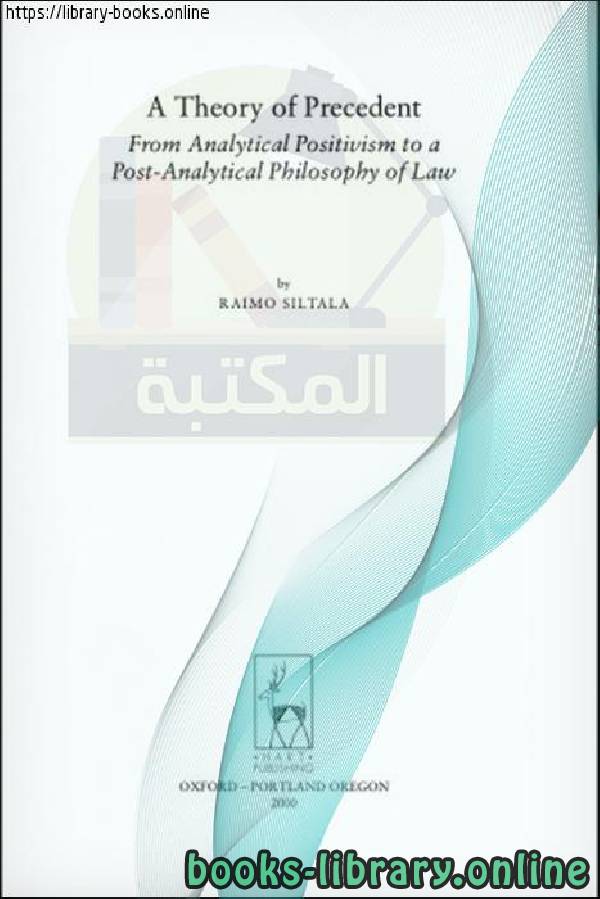📘 قراءة كتاب A Theory Of Precedent from analytical positivism to a post-analytical philosophy of law أونلاين


Today such extreme formalism in judicial decision-making is often taken as
a textbook example of legal fiction, although there are still some remnants of it
in the French system of adjudication.6 A somewhat more realistic interpretation
of the ideology of bound judicial decision-making would admit of a judge’s limited discretionary powers, as either deliberately delegated to the courts by
Parliament or as brought into effect in the mutual interaction of rapid social
change and the flexible legal standards laid down by the legislator. Thus, Hans
Kelsen argued that the application of a statutory or any other legal norm by
necessity requires some discretion on part of the judge.7 Hart, in turn, pointed
out that, because of the open-textured character of linguistic concepts and legal
rules, judges need to exercise some overtly rule-creating discretion on the
“grey”, penumbral areas of a legal rule’s semantic coverage.8
In Wróblewski’s classification, however, neither Kelsen nor Hart would
count as true representatives of the ideology of bound judicial decision-making,
because of the said discretionary powers granted to judges. But neither do they
easily qualify as representatives of the third category, the ideology of legal and
rational judicial decision-making. The Polish author himself admits that the
three-fold classification of the ideologies of judicial decision-making is not
clear-cut at the boundaries, due to its status as a set of reconstructions of judicial decision-making.9 In actual jurisdiction, a full-scale enforcement of the
ideology of bound judicial decision-making would, of course, be extremely rigid
and blind in the face of social injustice. The belief in the formal completeness of
law at the point of its inception and the denial of the interpretive powers of the
judiciary might also require some intellectual self-sacrifice on the part of judges
and other legal professionals alike.
1.2 Ideology of free judicial decision-making
Wróblewski’s ideology of free judicial decision-making is an expression of the
revolt against legal formalism, as inspired by the shortcomings of legal positivism
of the nineteenth century. The ideology of free judicial decision-making comprises various intellectual movements such as François Gény’s libre recherche scientifique in France, the Freirechtslehre or Freirechtsbewegung (i.e. Free Law
Movement) in Germany, sociological jurisprudence and the realist movement in
the United States, and the Führerstaat ideology of Nazi Germany in the 1930s.10
4 How to Do Things with Precedents
6 See M. Troper, C. Grzegorczyk and J. Gardies, “Statutory Interpretation in France”, in D.N.
MacCormick and R.S. Summers (eds), Interpreting Statutes: A Comparative Study (Dartmouth,
1991), 203–4, 211. Cf. M. Troper and C. Grzegorczyk, “Precedent in France”, in MacCormick and
Summers, ibid., 107, where it is said that the judges are supposed to exercise, not “judicial power”,
but only a “jucidial function”. 7 Kelsen, above at n. 4, 233–6. 8 H.L.A. Hart, The Concept of Law (Clarendon Press, Oxford, 1961), 124–8, 200. 9 Wróblewski, above at n. 1, 267. 10 On the ideology of free judicial decision-making, see Wróblewski, ibid., 284–304, and on its
general description and theoretical justification, see ibid., 284–94.
Moreover, it may be taken to refer to any judicial ideology in which the role of the
judge is emphasised, and the role of the legislator is belittled, in the creation of
valid legal norms. As adherents of the ideology of free judicial decisionmaking Wróblewski mentions Gény, Ehrlich, Kantorowicz, Heck, Schmitt, and
Bülow, among others.
The ideology of bound judicial decision-making was said to be connected
with the ideas of political liberalism. No parallel, uniform background rationale
can be pointed out for the ideology of free judicial decision-making, with the
one exception of national socialism and the ideas put forth by the legal scholars
of the Third Reich.
11 Rather, what is common to all the various traits of free
judicial decision-making is their critical attitude towards the formalist premises
of legal positivism and the ideology of bound judicial decision-making. The profound changes which have taken place in the legislative techniques in the twentieth century may have, in part, contributed to the birth of such judicial
anti-formalism. An increased use of general clauses in legislation has denoted a
more or less open delegation of norm-creating power from the legislator to the
courts of justice,12 and the general belief in the formal values of legal positivism
may also have waned among citizens. Instead of the formal characteristics of law,
the ideology of free judicial decision-making underscores the dynamic character
of jurisdiction, its responsiveness to the problems of the real world “out there”.
Apart from statutory rules, Wróblewski enumerates the following valueladen sources of law which are acknowledged by the ideology of free judicial
decision-making: legal practice, social rules, social facts and social regularities,
evaluations of facts connected with law, evaluation of other facts, sources of
evaluations, and evaluations in general.13 Wróblewski also comments briefly on
the American doctrine of the “hunch”, or an irrational, emotion-based evaluation of the concrete facts at hand and the judge’s intuitive legal response to it;14
but his main emphasis is on the European free law doctrine. Despite his rather
severe criticism, Wróblewski still deems the ideology of free judicial decisionmaking to be better grounded than the bound alternative.15
1.3 Ideology of legal and rational judicial decision-making
The third alternative, the ideology of legal and rational judicial decisionmaking, is given a somewhat laconic treatment by the Polish legal philosopher,
even though it is the one he himself opts for.16 Wróblewski defines this
Frame of Analysis 5
11 Ibid., 297. 12 On a critical account of the impact of such general clauses, see J.D. Hedemann, Die Flucht in
die Generalklauseln: Eine Gefahr für Recht und Staat (JCB Mohr, Tübingen, 1993). 13 Wróblewski, above at n. 1, 292–3. 14 Ibid., 290. 15 Ibid., 300–1. 16 Ibid., 305–14. At 311–13, some attention is given to socialist legal systems as examples of the
ideology of legal and rational judicial decision-making. Subsequent changes in society though, have
turned such considerations to address issues of legal history.
اليوم مثل هذه الشكليه المتطرفة في صنع القرار القضائي وغالبا ما تتخذ
مثال على كتاب مدرسي عن الخيال القانوني ، على الرغم من أنه لا يزال هناك بعض من بقايا ذلك
في النظام الفرنسي للحكم. 6 تفسير أكثر واقعية إلى حد ما
سوف تعترف أيديولوجية صنع القرار القضائي الملزم بسلطات القاضي التقديرية المحدودة ، كما يتم تفويضه عمداً إلى المحاكم من قبل
البرلمان أو كما دخلت حيز التنفيذ في التفاعل المتبادل السريع الاجتماعي
التغيير والمعايير القانونية المرنة التي وضعها المشرع. وبالتالي ، هانز
جادل كيلسن أن تطبيق قانون أو أي قاعدة قانونية أخرى من قبل
ضرورة تتطلب بعض السلطة التقديرية من جانب القاضي. 7 هارت ، بدوره ، أشار
إلى ذلك ، بسبب الطابع المفتوح محكم للمفاهيم اللغوية والقانونية
القواعد ، والقضاة بحاجة إلى ممارسة بعض السلطة التقديرية لإنشاء قواعد علنية على
"رمادية" ، المناطق شبه الخطية للتغطية الدلالية للقاعدة القانونية
ولكن في تصنيف Wróblewski ، لم يفعله كلسن ولا هارت
اعتبار الممثلين الحقيقيين لأيديولوجية اتخاذ القرارات القضائية الملزمة ،
بسبب الصلاحيات التقديرية المذكورة الممنوحة للقضاة. ولكن لا يفعلون ذلك
بسهولة التأهل كممثلين عن الفئة الثالثة ، أيديولوجية القانونية و
صنع القرار القضائي العقلاني. المؤلف البولندي نفسه يعترف بأن
تصنيف ثلاثة أضعاف أيديولوجيات صنع القرار القضائي ليست كذلك
واضحة على الحدود ، بسبب وضعها كمجموعة من عمليات إعادة صنع القرار القضائي .9 في الولاية القضائية الفعلية ، إنفاذ واسع النطاق لل
إن أيديولوجية اتخاذ القرارات القضائية الملزمة ستكون ، بالطبع ، جامدة للغاية
والمكفوفين في وجه الظلم الاجتماعي. الاعتقاد في اكتمال رسمي من
القانون في نقطة نشأته وإنكار الصلاحيات التفسيرية لل
قد يتطلب القضاء أيضًا بعض التضحية بالنفس من جانب القضاة
وغيرهم من المهنيين القانونيين على حد سواء.
1.2 أيديولوجية اتخاذ القرارات القضائية المجانية
أيديولوجية Wróblewski لصنع القرار القضائي الحر هي تعبير عن
تمرد ضد الشكليات القانونية ، كما هو مستوحى من أوجه القصور في الوضعية القانونية
من القرن التاسع عشر. تشتمل أيديولوجية صنع القرار القضائي الحر على حركات فكرية مختلفة ، مثل علم الحرية الذي يدرسه فرانسوا جيني في فرنسا أو Freirechtslehre أو Freirechtsbewegung (أي القانون الحر).
الحركة) في ألمانيا ، الفقه الاجتماعي والحركة الواقعية في
الولايات المتحدة ، وإيديولوجية الفهرستات في ألمانيا النازية في ثلاثينيات القرن العشرين
4 كيف نفعل الأشياء مع السوابق
6 انظر M. Troper ، C. Grzegorczyk and J. Gardies ، "التفسير القانوني في فرنسا" ، في D.N.
MacCormick و R.S. الصيف (محرران) ، تفسير القوانين: دراسة مقارنة (دارتموث ،
1991) ، 203-4 ، 211. راجع M. Troper و C. Grzegorczyk ، "الأسبقية في فرنسا" ، في MacCormick و
سامرز ، المرجع نفسه ، 107 ، حيث يقال إن القضاة من المفترض أن يمارسوا ، وليس "سلطة قضائية" ،
ولكن فقط "وظيفة jucidial". 7 كيلسن ، أعلاه في ن. 4 ، 233–6. 8 هـ. Hart، The Concept of Law (Clarendon Press، Oxford، 1961)، 124–8، 200. 9 Wróblewski، above at n. 1 ، 267. 10 حول أيديولوجية صنع القرار القضائي الحر ، انظر Wróblewski ، المرجع نفسه ، 284-304 ، وعلى
الوصف العام والمبرر النظري ، انظر المرجع نفسه ، 284-94.
علاوة على ذلك ، قد يلزم الإشارة إلى أي أيديولوجية قضائية يلعب فيها دور
وشدد القاضي ، ودور المشرع هو التقليل ، في إنشاء
قواعد قانونية سارية. يذكر أتباع أيديولوجية صناعة القرار القضائي الحر أن روبيلوفسكي يذكر جيني وإيرليتش وكانطوروفيتش وهيك وشميت و
Bülow ، من بين أمور أخرى.
وقيل إن أيديولوجية اتخاذ القرارات القضائية الملزمة مرتبطة
مع أفكار الليبرالية السياسية. لا يوجد خلفية متوازنة ومبررة
يمكن الإشارة إلى أيديولوجية صنع القرار القضائي الحر ، مع
استثناء واحد من الاشتراكية القومية والأفكار التي طرحها علماء القانون
الرايخ الثالث.
11 بدلا من ذلك ، ما هو مشترك بين جميع الصفات المختلفة مجانا
صنع القرار القضائي هو موقفهم النقدي تجاه المباني الشكلية
الوضعية القانونية وأيديولوجية اتخاذ القرارات القضائية الملزمة. إن التغييرات العميقة التي حدثت في التقنيات التشريعية في القرن العشرين ربما أسهمت ، جزئياً ، في ولادة مثل هذا النظام القضائي.
مكافحة الشكلية. زيادة استخدام الشروط العامة في التشريعات قد دلت على أ
أكثر أو أقل من التفويض المفتوح لسلطة وضع القواعد من المشرع إلى
محاكم العدل ، 12 والإيمان العام بالقيم الرسمية للوضعية القانونية
قد تضاءل أيضا بين المواطنين. بدلا من الخصائص الرسمية للقانون ،
تؤكد أيديولوجية صنع القرار القضائي الحر الطابع الديناميكي
الاختصاص ، واستجابتها لمشاكل العالم الحقيقي "هناك".
بصرف النظر عن القواعد القانونية ، يعدد Wróblewski مصادر القانون التالية التي تعترف بها أيديولوجية القضاء الحر
سنة النشر : 2000م / 1421هـ .
نوع الكتاب : pdf.
عداد القراءة:
اذا اعجبك الكتاب فضلاً اضغط على أعجبني و يمكنك تحميله من هنا:

شكرًا لمساهمتكم
شكراً لمساهمتكم معنا في الإرتقاء بمستوى المكتبة ، يمكنكم االتبليغ عن اخطاء او سوء اختيار للكتب وتصنيفها ومحتواها ، أو كتاب يُمنع نشره ، او محمي بحقوق طبع ونشر ، فضلاً قم بالتبليغ عن الكتاب المُخالف:
 قبل تحميل الكتاب ..
قبل تحميل الكتاب ..
يجب ان يتوفر لديكم برنامج تشغيل وقراءة ملفات pdf
يمكن تحميلة من هنا 'http://get.adobe.com/reader/'


 منصّة المكتبة
منصّة المكتبة 